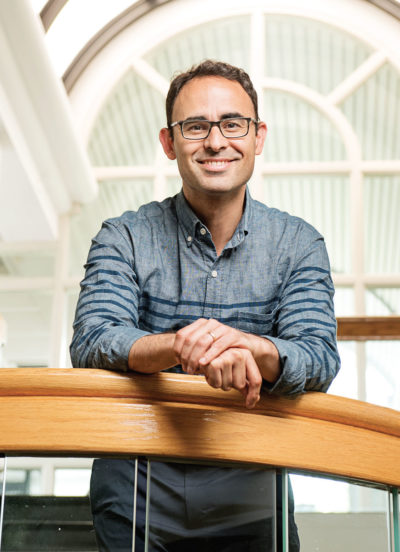Sinan Erzurumlu (pronounced See-nan Erz-oo-room-loo) was born and raised in Turkey, but he doesn’t want to identify himself only as Turkish. Not that he has anything against Turkey. Growing up with a fun older brother and loving parents in Izmir, which he describes as a liberal-minded city on the west coast, life was great.

Photo: Webb Chappell
Sinan Erzurumlu
Erzurumlu simply prefers to live with no boundaries. “I’ve always seen myself as a world citizen,” he says. “We’re all people. We should chase ideas and cultures and live in places where we feel the most comfortable. I choose to be open minded. I think that pushed me in what I want to do in life and my journey to a Ph.D., which I had no intention of doing. It happened because I chased an idea and realized it was great.”
Now an associate professor of operations management, Erzurumlu initially thought he would become an engineer. In Turkey, all students take an exam before college: The better they perform, the more likely they can attend their school of choice. Out of 1.5 million students, Erzurumlu was ranked 63rd, a feat he describes with both pride and modesty, saying he did so well because he worked hard to prepare for the exam. (Perhaps, but the 1,499,937 other students might have studied as well.)
With such a score, Erzurumlu could go to any school in the country and study whatever intrigued him. Having performed in plays throughout high school, he considered drama, as well as business and economics. But in the end, he followed a passion for math and science and earned his undergraduate degree in engineering from Bogazici University in Istanbul. To balance his studies, he continued to act and played in bands throughout college. “I strongly believe that everybody should have at least two interests,” he says, “maybe a profession and something on the side. Because it works your brain very differently.”
In 1999 after graduating from college, he decided to come to the U.S. and earn a master’s in engineering at the University of Texas at Austin. A sense of adventure, a desire to study operations research and decision making, and a girlfriend on her way to Texas (being an exchange student, she didn’t stay for long) influenced his choice of schools. “My intention was to come here, get a degree, and then go back to Turkey in maybe two years,” he says.
But Erzurumlu kept discovering new areas of interest. He found himself drawn to research papers from the business school about topics such as supply chain management. Upon completing his master’s, Erzurumlu came to the conclusion that he liked the scientific methods and rigor of engineering but preferred applying what he learned to the business world. So he decided to stay and earn his Ph.D. in supply chain and operations management.
Unsure whether he wanted to stay in academia or enter the corporate world, he took a yearlong consultancy gig at Dell while working on his degree. “All this schooling was great, but I wanted to go out there and see how people are working,” he says. His charge included analyzing Dell’s post-sales, customer-service model. “I realized that it’s good fun,” he says of working with Dell, but he wanted the freedom of choosing what to study that comes with being a professor. “You’re like an entrepreneur of ideas as a faculty member,” he says. “You come up with an idea. You hope that it’s worthwhile. You check with people, if they’re going to like the idea, and then you start raising it and solve it and tell people about the solution. I really like that aspect of being a professor.”
Erzurumlu also enjoys being in front of people and connecting with them on a social level, so coming to Babson, where research and teaching are equally valued, was an ideal opportunity. In 2007, he joined the Technology, Operations, and Information Management Division and teaches undergraduate and graduate students. Erzurumlu’s research spans a range of topics, including how operational efficiencies can stimulate growth, as well as strategies for social innovation and sustainability. Caring for the environment long has been important to Erzurumlu, who talks about an aptitude test he took as a youth that suggested he become a forest engineer. “I laughed at it,” he says, “but that test was pretty good, showing my connection with nature and caring about why we are not living within our means and always chasing growth.”
So Erzurumlu incorporates sustainability issues into his courses, and he developed and teaches “Leading and Managing Sustainability,” which examines the issue from an operational but also a personal level. “I include a discussion about consciousness and values, even as a manager. How much profit is good profit? How much growth is good growth?” he says.
Erzurumlu recently completed a case study with Preserve, which manufactures 100 percent recycled household products. Eric Hudson, MBA’92, founder and CEO of Preserve, asked himself similar questions. “Eric could have easily grown his company much faster,” says Erzurumlu, “but that’s not exactly what he wanted to do. He asked himself what a company should exist for and what should be its true goals. It’s a good example of how he integrated his values into what he wants to do with his company.”
Getting to know his students, Erzurumlu sees a generation of soul searchers and believes sustainability speaks to them. They’re ambitious, he says, and want professions that are in line with their values. “They believe they can do more than make money with their business degrees,” he says. “I really respect the Babson students. This truly is an entrepreneurial place to learn, and even if you don’t come here saying you want to be an entrepreneur, it rubs off on you.”
